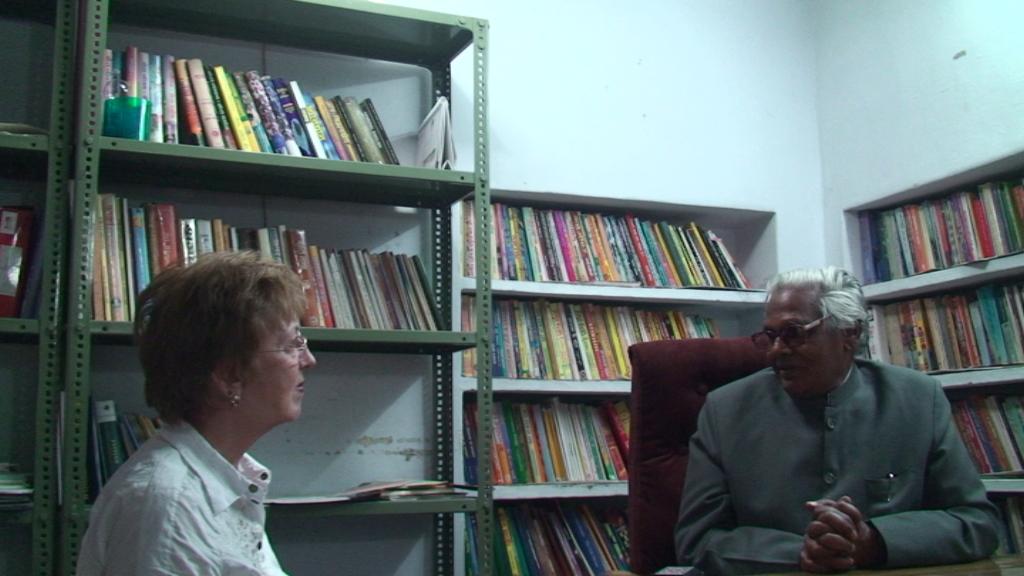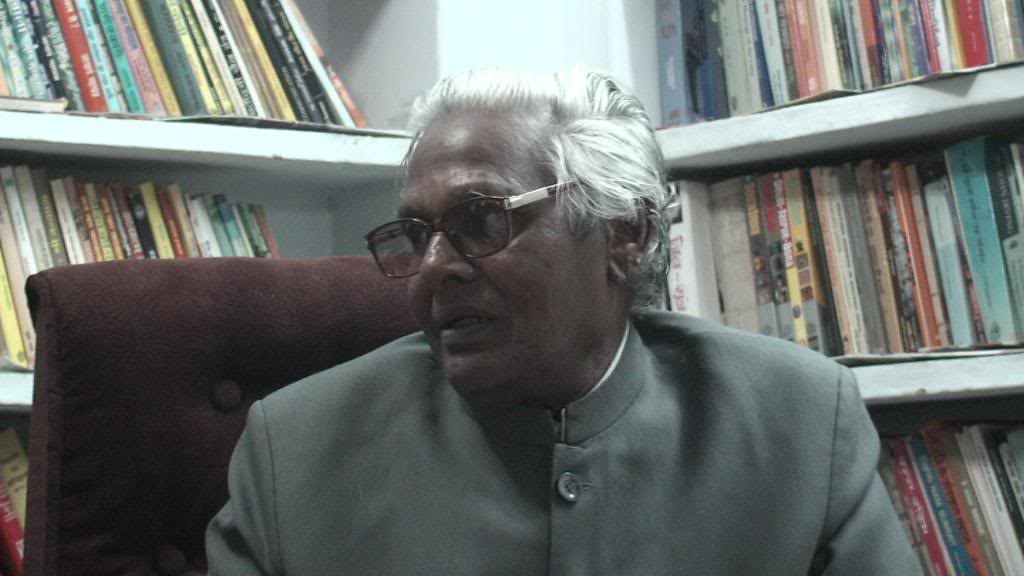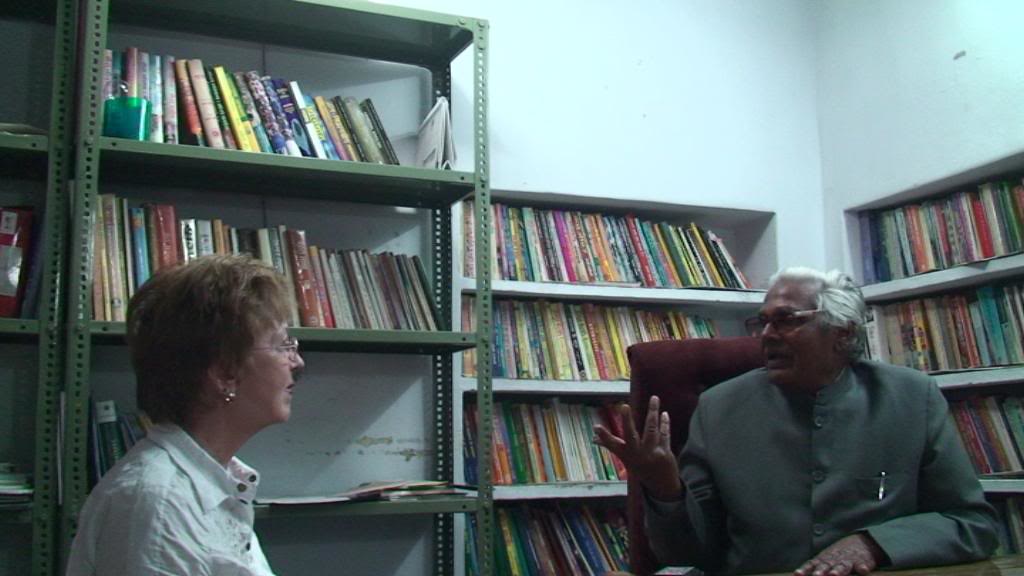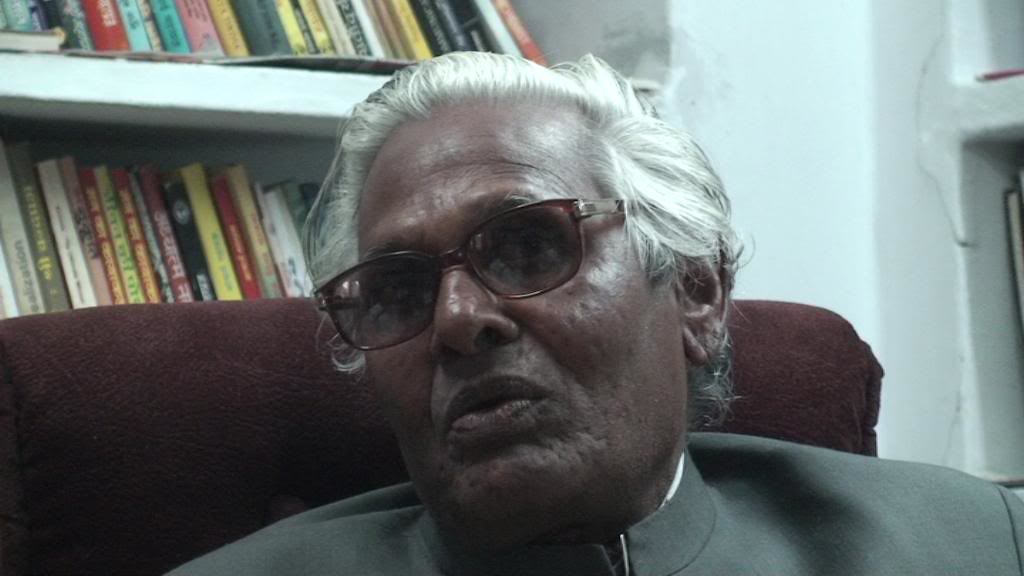 Karuna Jain interviewing Dr. Sohan Lal Gandhi, President of Anuvrat Global Organization (ANUVIBHA)
Karuna Jain interviewing Dr. Sohan Lal Gandhi, President of Anuvrat Global Organization (ANUVIBHA)
Republic Day was a lucky day for us. Dr. Sohan Lal Gandhi, President of Anuvrat Global Organization (Anuvibha) was in Jaipur and free for a talk. He received us in his house in Jaipur where we spoke nearly an hour. He was sitting at his desk, with many books surrounding him. It was apparent that he all had read. They were like friends watching what lessons he had taken from them and what he had realised thereof. This became manifest during the talk. Our London friends told us after having attended his lectures on training in non-violence how much it had inspired them. Dr. Gandhi is not only a gifted lecturer. It is also a pleasure to be in his presence. He practices non-violent communication and also mental communication, communication without words. It was a real pleasure to hear his views and experiences on training in non-violence and non-violent education.
After welcoming us with words of appreciation for the service we are doing we started our talk. I wanted to know Training In Nonviolence - Theory & Practice how the idea to compile texts from H.H. Acharya Mahapragya in the book had come to his mind.
Dr. Gandhi said that there are many problems in the world because of human conduct. Karmic bondage is tied up through thoughts, speech and actions. If human conduct is oriented towards peace and non-violent action the karmic bondage can be demolished carefully. Therefore Peace Education leads to the most important objective of human existence: Peace. Peace in thoughts, words, and actions demands a systematic way of training people how to implant a peaceful attitude in daily life.
 Dr. Sohan Lal Gandhi, President of Anuvrat Global Organization (ANUVIBHA)
Dr. Sohan Lal Gandhi, President of Anuvrat Global Organization (ANUVIBHA)
In 1987 he was in the US and noticed that people feared an attack from the Soviet Union. They asked him about non-violence in times of attack and for advice how to respond to fear. When he returned to India, he reported this to his spiritual Gurus, Acharya Tulsi and his then Yuvacharya Mahapragya. They worked out physical exercises and meditational postures to train people in non-violence. According to them, only the fearless can be non-violent.
They invited young members of Anuvrat Movement to stay with them, to practice the program, and experience the results of attitudinal change. The impact on them was very strong, and so was the change. They had more self-confidence and more trust in succeeding to what they were aiming at.
Dr. Gandhi holds the view that the majority of people wants peace and does not refer to violence. To strengthen this inherent peaceful attitude in them, the dictum was applied, "I will not kill an innocent creature." In the west this was difficult to accept, so Acharya Tulsi modified the dictum into, "I will not kill an innocent human being." From this the slogan was evolved, "Refrain from unnecessary violence". Violence is happening around us, but we should not participate willingly in it and mentally not accept the reality it creates in human life. A neutral attitude towards violence is not harmful to the own non-violent vibrations.
 Karuna Jain interviewing Dr. Sohan Lal Gandhi, President of Anuvrat Global Organization (ANUVIBHA)
Karuna Jain interviewing Dr. Sohan Lal Gandhi, President of Anuvrat Global Organization (ANUVIBHA)
Principles and training methods were outlined to bring about changes in young people. They should be taught to trust in their own non-violent nature. Endurance and tolerance are the base to successfully manage emotions. Thus emotional intelligence becomes emotional competence, the key to success and happiness in life. During the training two days of creative silence were implemented, meant to store energy for the process of transformation instead of speaking. While speaking material clusters are build, acting as hindrances to the flow of energy. The results were remarkable. The storage of energy resulted in enlarged emotional competence, and different experience of communication was possible. Communication did not stop, but changed to silent communication from heart to heart, mind to mind.
 Dr. Sohan Lal Gandhi, President of Anuvrat Global Organization (ANUVIBHA)
Dr. Sohan Lal Gandhi, President of Anuvrat Global Organization (ANUVIBHA)
Non-violent educatuion first has to win the hearts of young people, and not making them angry through prohibition and imposing own objectives. The first change that has to take place should be brought about in the peace-educator himself. To inspire others for change means to change oneself first. This means to surrender oneself to the kids to receive their desirable response.
Further it is not beneficial for young people to be exposed too often to competition. The more and more competitive spirit in nursery and school has a harmful effect on young people. Even 30% of adults would fail in competition Dr. Gandhi quoted research results. Adults also have difficulties to handle loss in competition, how much more this affects the emotional balance of young people. Non-violent education should start giving value to stress free learning according to the own capabilities. Thus emotional intelligence and resulting thereof emotional competence steadily is built up supporting an increasingly non-violent lifestyle even in a young age of life.
 Editor Carla Geerdes
Editor Carla Geerdes